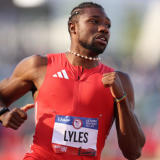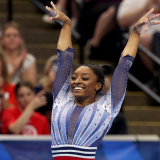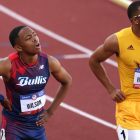Bode Miller gets it. He won six Olympic medals, one gold, three silvers, two bronze, and is the greatest men's alpine skier in United States history, period. And yet, the one thing that most Americans think about when they think about Bode Miller isn't success. Not the two World Cup overall trophies, the five world championship medals, nor the U.S. record 33 World Cup victories he bagged in five different disciplines.
No, Bode Miller is known most in his own country for being a huge bust after his 0-for-5 showing at the 2006 Turin Olympics. And, honestly, he's OK with that, because, as Miller points out, it truly wasn't the colossal failure that it was made out to be.
"I was 11 hundredths off the podium in the [downhill]," Miller stated flatly, speaking on the phone from California before heading to Pyeongchang to help call the Olympic alpine races for NBC. "If you can click your watch on your stopwatch and get 11 hundredths, you'll realize how quick that is after a couple minutes of racing and all the variables with wind and snow condition and start position and all that stuff."
He was also way ahead after the downhill and first slalom run in the combined before he hooked a tip that "nobody really even saw" until race officials were alerted to it, he said.
Not that it matters now, like it didn't matter then. After being hyped in the lead-up to the Turin Olympics by every major U.S. news outlet and an army of sponsors, most notably Nike, which urged Americans to "Join Bode," the blowback was unforgiving. The media savaged him, sponsors dropped him and the U.S. Ski Team pulled its funding, leaving its best male skier to travel the World Cup circuit for two years as an independent, paying for his own coaching and training staff and a cook and competing as a team of one.
"Team America" is what Miller took to calling it, a fitting contradiction for a skier famous for them.
Not that Miller regrets any of it. He seems perfectly content with his skiing career and the life it has provided him. He's married to a former professional beach volleyball player, has four kids, and lives in San Diego where he spends his time breeding horses and overseeing his various business and philanthropic ventures. He's a stakeholder in Aztech Mountain, a luxury men's outerwear and ski brand, and Bomber, a ski and pole brand.
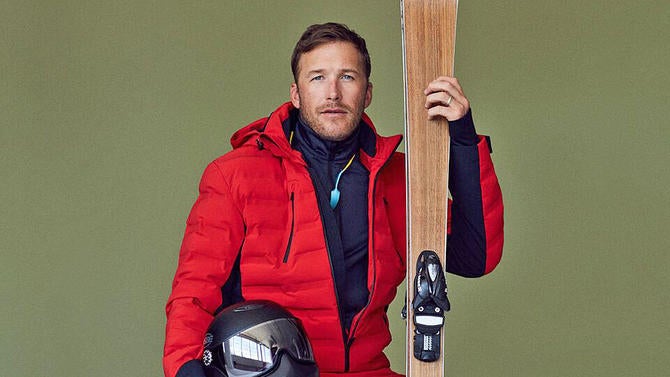
Of the business ventures, Miller says he's not just a name or a face used to sell gear and collect a check.
"When I retired I got to choose my partner more from a perspective of what I liked and what I wanted," he said. "It's rare that you find a small group of younger people who have such an aligned view or vision of things that you can partner with. That was a no-brainer."
If he could change anything, it's this: his shortcomings in Turin -- and his career as a whole -- could've been put in better context. Yeah, he did all the publicity, cashed those sponsors' checks and said all those things -- including his infamous quote to the AP's Jim Litke in Turin that "I got to party and socialize at an Olympic level." But to say he wasn't trying or didn't care? Fake news.
"In the end, I probably should've done different things and probably behaved differently, but I'd sort of always been the way that I was," he said. "That wasn't like it was something new and shocking. They didn't do a very good job portraying my performance, they just said it was a massive failure. And the reality is what I just described to you. It was only a minor failure, especially considering that all year I hadn't won a single race. It was actually better than what I'd been doing all year."
Fast-forward to 2018, and the first Winter Olympics since the 1998 Nagano Games where he won't be competing for the United States, and Miller explains that what he really hopes to accomplish in his analyst role with NBC is to provide American television viewers the necessary perspective on just how hard it is to win a single ski race.
He compared it to trying to explain the intricacies of American football to European soccer fans, something he knows all too well from his winters spent in Europe traveling the World Cup circuit.
"I think, half the people watching it will not have seen a World Cup race or a ski race since the last Olympics, which is four years ago," said Miller, a New Hampshire native who is a big Patriots fan. "The Europeans are very educated and it's part of their culture and they love it that way. A lot of Americans don't really understand and it only becomes about winning medals."
Not that the United States shouldn't win medals in alpine skiing at these Olympics. Mikaela Shiffrin, just 22 and already with an Olympic slalom gold from Sochi, is the favorite in slalom again and should compete for a podium spot in giant slalom and the combined. Lindsey Vonn, the most successful women's ski racer in history, is the heavy favorite in the women's downhill and is coming off three straight World Cup downhill wins.
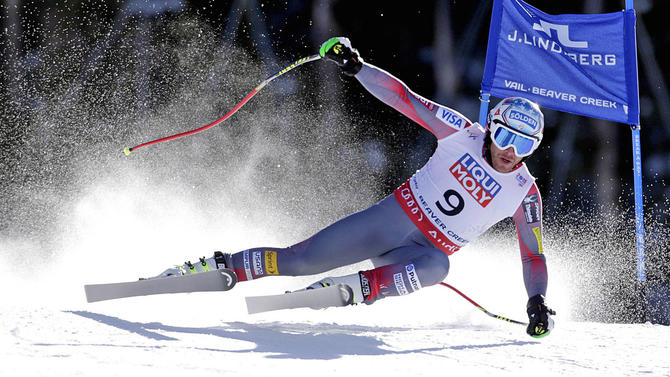
On the men's side, Miller admits, the expectations are much lower, with Ted Ligety -- a two-time Olympic gold medalist -- the best medal threat on the men's team.
Yet, Miller says, counting medals before they're won is fool's gold, especially in ski racing.
"I mean, Ted is certainly capable of winning, but the U.S. just automatically expects people to win medals all the time," Miller said. "That's not really the case in skiing. Skiing's just not that way, anytime, for any country, but especially the Americans at the big games. It's tough … Only one guy wins each event. You can't say that every other person in the race failed."
Miller, who won his last Olympic medal at the 2014 Sochi Olympics in his last season on the World Cup tour, long after most had written him off, says he hopes to give an American audience "a good time" while they're watching on NBC and help them "root for our guys and sort of let them know what would be a successful Olympics since it's different for every person."
In the process, Americans may also discover something about Miller, who was often at odds with the American ski press and painted as an outlaw and a hypocrite.
Context. Though Miller never says the word, it's clear that's what he's driving at when it comes to telling the story of the United States' performance in the alpine events in Pyeongchang, for better or worse.
"I'm not saying stuff that I say about the media to be mean or critical. I'm saying it because I expect it to change and I want to give it perspective that might help the media to do a better job," he said. "My references were always some old school sportswriters and, in the '30s and '40s, sportswriting was an art. It was imagination and creativity and you were trying to portray something and enhance the person's experience. In a lot of cases, that was the only exposure to the sport that those people reading your articles had. Just like a good radio commentator, it's an art. I think the art has been lost, and in my opinion, that's a shame."



